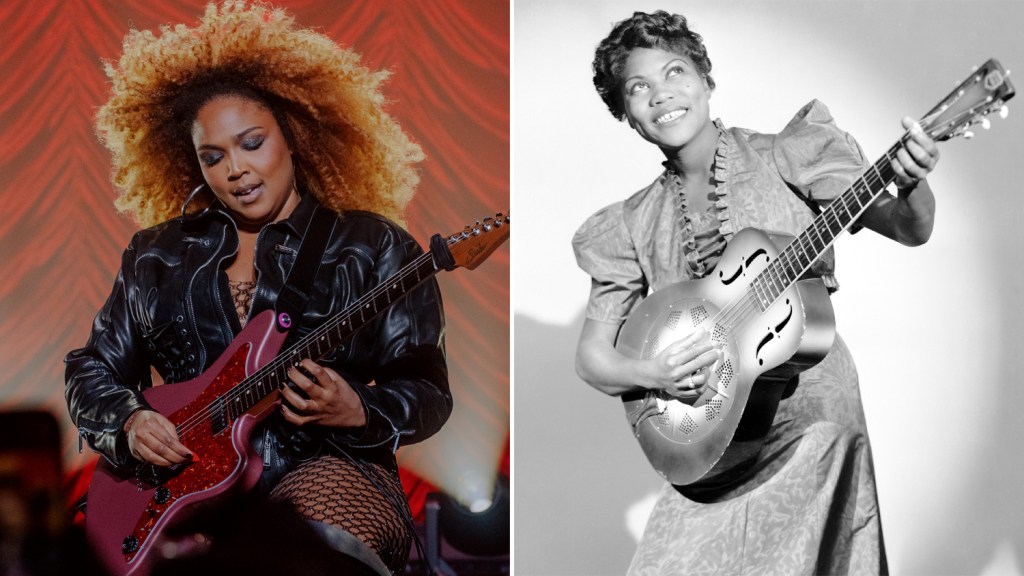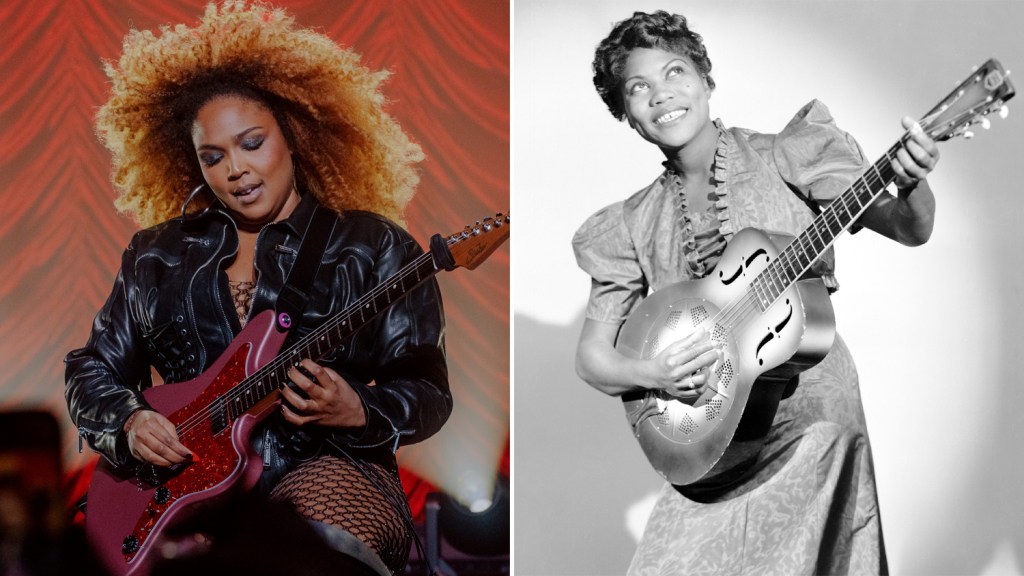## From “Good as Hell” to Gospel Guitar Goddess: Lizzo Steps Into the Spotlight as Sister Rosetta Tharpe Get ready to witness a musical legend reborn! Pop icon and flute-wielding powerhouse Lizzo is trading in her signature sass for a touch of gospel fire, stepping into the iconic shoes of Sister Rosetta Tharpe. Yes, you read that right – Lizzo is set to portray the groundbreaking “Godmother of Rock ‘n’ Roll” in Amazon MGM Studios’ upcoming biopic “Rosetta.” This isn’t just another casting choice, folks; it’s a match made in musical heaven. Prepare to dive into the electrifying life story of a woman whose influence shook the foundations of music, paving the way for generations of rock stars.
Tharpe’s Influence on Popular Music

Sister Rosetta Tharpe, the subject of Amazon MGM Studios’ upcoming film “Rosetta,” was a pioneering figure in the music world, whose influence spans genres and decades. Tharpe’s unique blend of gospel, blues, and rock ‘n’ roll created a sound that not only captivated audiences of her time but also laid the foundation for future generations of musicians. Her innovative style inspired some of the most iconic names in rock ‘n’ roll, including Elvis Presley, Chuck Berry, Little Richard, Johnny Cash, and Bob Dylan.
Tharpe’s music was a fusion of her gospel upbringing and her love for the blues. Her powerful vocals and electrifying guitar playing were unlike anything else on the radio at the time. She was the first gospel artist to incorporate electric guitar into her performances, a move that would later become a staple of rock ‘n’ roll. Her hit song “Strange Things Happening Every Day” is often cited as one of the first rock ‘n’ roll records, showcasing her signature sound that combined spiritual lyrics with a raucous, upbeat rhythm.
Tharpe’s legacy extends beyond her musical innovations. As a queer black woman from Cotton Plant, Arkansas, she broke significant cultural barriers. She was the first gospel artist to perform in front of integrated audiences, paving the way for other artists to challenge racial segregation. Her tours with white singers like the Carter Family and Red Foley in the 1940s were groundbreaking, as she defied the color line that was prevalent in the music industry at the time.
Tharpe’s impact on popular music is immeasurable. Her fusion of genres and her fearless approach to performance inspired countless artists. For instance, Chuck Berry cited Tharpe as one of his influences, noting her use of the electric guitar in gospel music. Little Richard, often referred to as the “architect of rock ‘n’ roll,” also acknowledged Tharpe’s influence, stating that her music was a significant inspiration for his own sound.

Her Music
Tharpe’s discography is a testament to her musical genius. Her 1946 hit “Down by the Riverside” is a classic example of her signature sound, blending gospel lyrics with a bluesy rhythm. The song reached number one on Billboard’s Rhythm and Blues chart and remained a staple of her live performances. Another standout track is “Crazy People,” which showcases Tharpe’s dynamic guitar playing and her ability to seamlessly switch between gospel and blues styles.
Her influence can be heard in the works of many contemporary artists. For example, Tharpe’s use of call-and-response patterns in her music is a technique that has been adopted by various genres, from hip-hop to pop. Her innovative use of the electric guitar has also been emulated by countless guitarists, from Jimi Hendrix to Stevie Ray Vaughan. Tharpe’s music continues to resonate with audiences today, proving that her legacy is timeless.

Legacy
Tharpe’s legacy is multifaceted, encompassing her musical innovations, her impact on popular culture, and her trailblazing career as a queer black woman. Her ability to blend genres and perform in front of diverse audiences made her a true pioneer in the music industry. Tharpe’s music was not only influential but also reflected her personal experiences and struggles, making her story even more compelling.
Her story is one of resilience and courage. Despite facing societal constraints and personal challenges, Tharpe continued to create groundbreaking music and perform in front of diverse audiences. Her ability to navigate these obstacles with grace and determination has made her a role model for generations of artists.
Tharpe’s impact on the music industry is evident in the countless artists who have cited her as an influence. Her fusion of gospel, blues, and rock ‘n’ roll created a unique sound that continues to inspire musicians today. Tharpe’s legacy is a testament to her talent, her courage, and her ability to break down barriers.
Lizzo’s Involvement in the Project
Why Lizzo

Lizzo, the four-time Grammy winner, is set to bring Sister Rosetta Tharpe to life in the upcoming Amazon MGM Studios film “Rosetta.” Lizzo’s own musical journey and her deep connection to Tharpe’s legacy make her the perfect choice for the role. Lizzo, known for her powerful vocals and electric performances, embodies the spirit of Tharpe in many ways. Both artists are known for their unique sounds, their fearless performances, and their ability to blend genres.
Lizzo’s music career has been marked by her ability to break boundaries and challenge conventions. Her hit songs like “Truth Hurts” and “About Damn Time” have not only topped the charts but also sparked conversations about identity, empowerment, and self-love. Lizzo’s music reflects her own experiences as a queer black woman, much like Tharpe’s music reflected her own journey. This shared experience makes Lizzo particularly well-suited to bring Tharpe’s story to the screen.
Lizzo’s involvement in the project is not just about her acting skills; it’s also about her passion for music and her commitment to amplifying the stories of underrepresented communities. Lizzo has consistently used her platform to advocate for diversity and inclusion in the music industry, making her a natural choice to tell Tharpe’s story.

Lizzo’s Music Career
Lizzo’s ascent to stardom has been nothing short of meteoric. Her breakthrough single “Good as Hell” in 2016 introduced the world to her unique sound and powerful lyrics. However, it was her 2017 hit “Truth Hurts” that catapulted her to mainstream success. The song, which became a viral sensation in 2017 and 2018, topped the Billboard Hot 100 chart, becoming the longest-running number one by a solo female rap artist ever. The song’s themes of heartbreak and resilience resonated with audiences, making it an anthem for many.
In 2023, Lizzo made history by becoming the first Black woman to win the Grammy for Record of the Year since 1994 for her hit “About Damn Time.” The song, which explores themes of empowerment and self-love, was a commercial and critical success. Lizzo’s music often addresses social and political issues, making her a powerful voice in the industry.
Lizzo’s music career is marked by her ability to blend genres, much like Tharpe’s own musical style. Her albums, such as “Cuz I Love You” and “Special,” showcase her versatility, incorporating elements of pop, rap, R&B, and funk. Lizzo’s music is a reflection of her own experiences and her commitment to authenticity, which is a trait she shares with Tharpe.

Lizzo’s Impact
Lizzo’s impact on the music industry is profound. As a queer black woman, she brings a unique perspective to her music and her performances. Her music often explores themes of self-love, empowerment, and the intersection of race, gender, and sexuality. Lizzo’s candidness about her own experiences has made her a role model for many, especially young queer women of color.
Lizzo’s involvement in the “Rosetta” project is significant not just because of her musical talent but also because of her ability to amplify the stories of underrepresented communities. Tharpe’s story, much like Lizzo’s, is one of resilience and courage in the face of adversity. Lizzo’s performance in “Rosetta” will bring Tharpe’s legacy to a new generation of audiences, ensuring that her story continues to inspire.
Lizzo’s music has also had a significant impact on popular culture. Her performances, which often feature elaborate costumes and choreography, have become iconic. Lizzo’s ability to blend music, fashion, and performance art has made her a cultural phenom. Her music has been featured in various media, from films to television shows, further cementing her status as a pop culture icon.
Significant Productions’ Mission
Championing Culturally Significant Films and Television Shows

Significant Productions, led by Nina Yang Bongiovi and Forest Whitaker, is dedicated to producing culturally significant films and television shows. The production company aims to showcase diverse stories and perspectives, ensuring that underrepresented voices are heard and amplified. Their mission aligns perfectly with the story of Sister Rosetta Tharpe, a pioneer who broke down barriers and challenged societal norms.
Significant Productions has a proven track record of discovering and nurturing talent. Their portfolio includes critically acclaimed films and TV shows that have resonated with audiences and critics alike. By producing “Rosetta,” Significant Productions continues its commitment to telling stories that matter, stories that inspire and challenge.
The involvement of Significant Productions in “Rosetta” is a testament to their dedication to diversity and inclusion. The film tells the story of a queer black woman who shattered musical boundaries and broke the color line, a narrative that is both timely and relevant. By bringing this story to the screen, Significant Productions is not only honoring Tharpe’s legacy but also amplifying voices that have been historically marginalized.
Producing Partners
Nina Yang Bongiovi and Forest Whitaker, the producing partners behind Significant Productions, are renowned for their ability to discover and nurture talent. Their producing credits include a range of critically acclaimed and commercially successful films and TV shows. Some of their notable projects include Ryan Coogler’s “Fruitvale Station” and Chloe Zhao’s “Songs My Brothers Taught Me,” both of which have garnered widespread acclaim.
Bongiovi and Whitaker’s approach to producing is rooted in their commitment to authenticity and storytelling. They have a knack for identifying talent and giving them the creative freedom to tell their stories. This approach has resulted in a diverse portfolio of projects that resonate with audiences and critics alike.
For “Rosetta,” Bongiovi and Whitaker bring their expertise in producing films that challenge conventions and tell stories that matter. Their involvement in the project ensures that Tharpe’s story will be told with the care and attention it deserves. With Lizzo at the helm and a talented team behind the scenes, “Rosetta” is poised to be a landmark film that honors Tharpe’s legacy and amplifies her story.
In addition to “Rosetta,” Significant Productions is involved in a range of projects that reflect their commitment to diversity and inclusion. Their upcoming projects include the Amazon MGM premium fantasy series “Rise of the Empress” and the docuseries “Hollywood Black,” both of which aim to showcase diverse voices and stories. Significant Productions’ dedication to producing culturally significant content makes them a valuable partner in bringing Tharpe’s story to the screen.
Conclusion
So, there you have it: Lizzo, the global pop icon known for her infectious energy and unapologetic self-expression, is set to channel the spirit of the electrifying Sister Rosetta Tharpe in the upcoming Amazon MGM biopic “Rosetta.” This isn’t just a casting coup; it’s a monumental moment that promises to illuminate the often-overlooked legacy of a true pioneer in rock ‘n’ roll. Tharpe’s groundbreaking blend of gospel, blues, and country laid the sonic groundwork for countless musicians who followed, yet her story remains largely untold. Lizzo, with her own fierce commitment to musical innovation and empowering narratives, is perfectly poised to bring Tharpe’s life and influence to the forefront.
This project has the potential to spark a wider conversation about the history of rock music, acknowledging the crucial contributions of Black women who often find themselves relegated to the footnotes of musical history. It could inspire a new generation of artists, both male and female, to delve deeper into the roots of their musical heritage and recognize the trailblazers who paved the way. But more importantly, “Rosetta” stands as a testament to the enduring power of music to transcend boundaries, challenge conventions, and ultimately, empower us all.







Add Comment